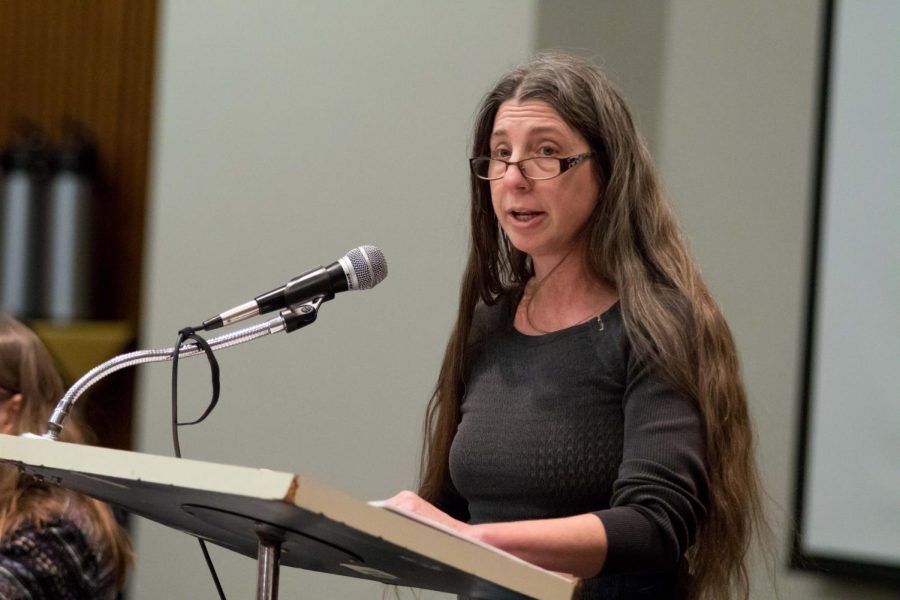Faculty Senate weighs options to implement official fall break
March 13, 2018
Uncertainty continued to loom over how to implement the official Fall 2018 break as Faculty Senate members rehashed options to alter the academic calendar Monday, including a new option to oust intersession.
During the last meeting in February, Melody Tankersley, the senior associate provost and dean of Graduate Studies, brought two options to the table to make the break a reality — shorten the spring semester by three days or shorten the summer term by three days.
Tankersley was not present this time, though as promised, a mock-up of a third alternative to modify the calendar was discussed.
Faculty Senate Chair Deb Smith began business by summarizing “universal” pros and cons of each option in bullet-point form on the projector in the Governance Chambers.
Slashing the summer term and eliminating intersession “affects fewer instructors and students than option one and two,” Smith said. She then opened the floor for discussion, which spawned a flood of questions and concerns.
Faculty Senate member Patti Baller voiced unease among faculty in the College of Nursing. She sent a poll to nursing faculty at all eight campuses to gauge their preferences; 40 responded, and she said shortening the spring semester was the prefered choice.
The other alternatives present hardships for courses and clinicals, especially considering clinical sites are in short supply, she said. Another worry is enticing prospective students to pursue nursing at the university.
“Option two (shortening summer) would cost the College of Nursing summer revenue between $200,000 to $300,000 as well as make our accelerated program an extra semester,” Baller said. “We are currently 15 months, while many other programs are 12 months, making our program less attractive.”
Flex scheduling, or open learning, may be a possibility for some classes, if the new option is adopted. Faculty Senate member Pamela Grimm posed a question: “If we choose to follow flexible scheduling, will (it) cause financial aid problems?”
Nobody had an answer.
Faculty Senate member Jennifer Walton-Fisette asked if there had been any talk of moving up spring break because senators working one-on-one with students know they desperately want to rest now but they instead have to forge ahead for another two weeks.
“The whole reason for having a fall break is for mental health, to have it in week eight, yet we go on week 11 for spring break,” she said.
Again, no definite answer.
Smith said she hasn’t heard of any discussion like that, though she can’t say she’s been involved in all of the conversations at the university.
“It is good that we have a couple of months to try to do this rather than it happening without our input, which was the original plan, but I still think it’s unfortunate, the way it’s going down,” Smith said.
Faculty Senate member Linda Piccirillo-Smith asked the room to give the man carrying around a microphone a round of applause, as he’d been running back and forth as senators chimed in with a range of opinions.
Though she knows fall break is a done deal, she said she can’t seem to let go of one thing:
“Adding these two days in the fall for mental health for students is only going to create more mental health issues when you have students finishing classes and then having finals, even if it’s not the same course, within two days,” Piccirillo-Smith said.
She said other colleges sometimes give undergraduate students an entire week to prepare and study before final exams.
“So we give them all the mental health opportunities in the fall, and the spring is like, ‘Sucks to be you, guess you learned your lesson now,’” she said, the room filling with laughter. “There’s like a real concern I have that people are going to melt down, especially second-semester freshmen, who won’t have any prior experience except that fall semester where they’ve been nurtured into their finals and now they’re going to have to hit the ground running.”
Once fall break has been tested, Smith said she hopes Faculty Senate requests data on whether “there was actually a mitigation of use of mental health facilities as a result.”
She has been requesting information from other universities that have instituted a fall break for mental health, and hasn’t received any data.
“If it’s not helping, I would hope maybe we’d fix the calendar back,” she said.
Faculty Senate will vote on how to carry out fall break at its next meeting April 12.
Valerie Royzman is an administration reporter. Contact her at [email protected]

























